Cycling Central Greece: 725 km in 9 Days
A challenging summer ride across the...
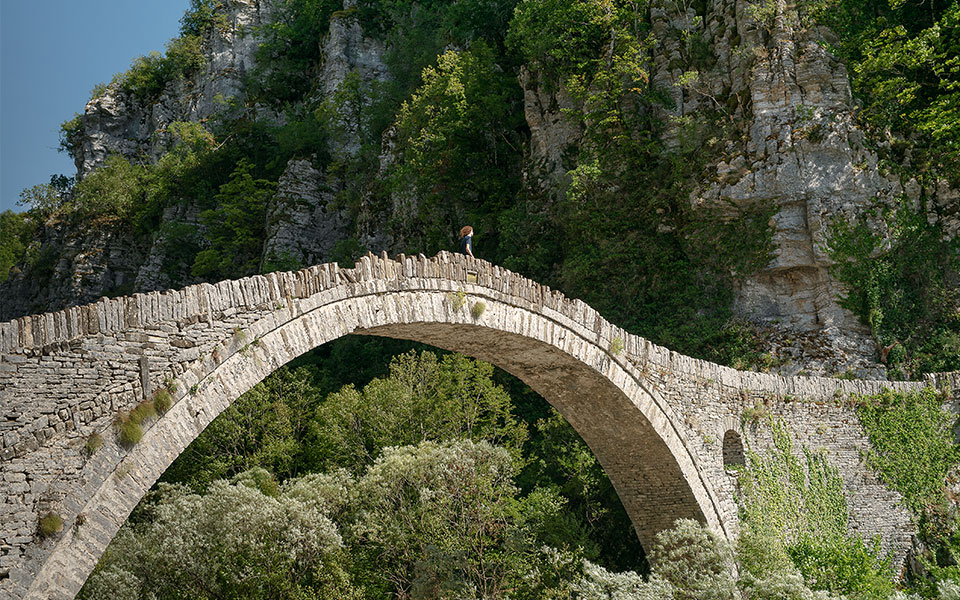
Kokkori bridge is one of the most well-known and beautiful bridges of Zagori.
© Penelope Thomaidi/Hans Lucas
The Zagori region in northwest Greece has it all: a rich natural environment, renowned for the rugged peaks of Mount Tymfi, its numerous rivers like the Voidomatis River, beautiful gorges like the Vikos Gorge, thick forests, and impressive rock formations. It’s no coincidence that the region is one of UNESCO’s seven geoparks in Greece and a national park (Vikos – Aoos). It is also rich in traditional architecture: 46 villages where the houses are entirely stone-built and topped with roofs made of schists, more than 100 bridges, and the famed “Skales” (literally “ladders”) – a network of stepped, cobbled roads that once linked the region’s villages.
It has an exquisite cuisine, too, one that is based on the shrewd home economics developed by past generations with the use of natural ingredients and local production. It has exceptional services, from tasteful guesthouses, marked hiking trails and outdoor activities to restaurants with traditional Epirus dishes. It has unique landscapes, a captivating fog that enhances the beauty of the region, and long, winding roads that snake their way across the terrain. Many bus-loads of people visit the villages, and encounter mountain communities in the region’s lesser developed areas.
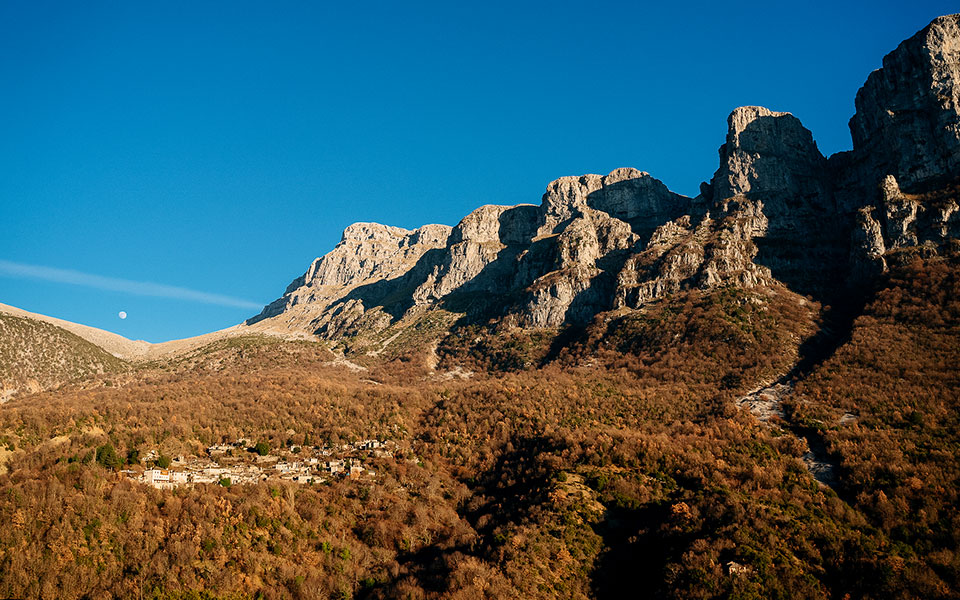
The imposing Towers of the village of Astraka. At the bottom, the village of Mikro Papingo.
© Amalia Coveou
Take a walk through the cosmopolitan village of Megalo Papingo with a view of the imposing Towers of Astraka, the first village of the region that was developed touristically. Equally popular is the village of Monodendri, which is worth visiting for the breathtaking view of the Vikos Gorge from the Monastery of Aghia Paraskevi or the Oxia View point that is located a bit further to the north. The villages of Vitsa and Dilofo are two beautiful villages that have retained their original, rustic character.
You can also discover the lesser known villages of Koukouli, where you can enjoy various herbal drinks at the traditional coffee shop of Vikogiatros and visit the Kostas Lazarides Natural History Museum. Kapesovo village, too, has a distinct charm and a beautiful traditional coffee shop. Drive out to the remote village of Vradeto to see the Vikos Gorge from the Beloi Viewpoint, as well as the more distant village of Tsepelodo, the home of Rogovou Monastery.
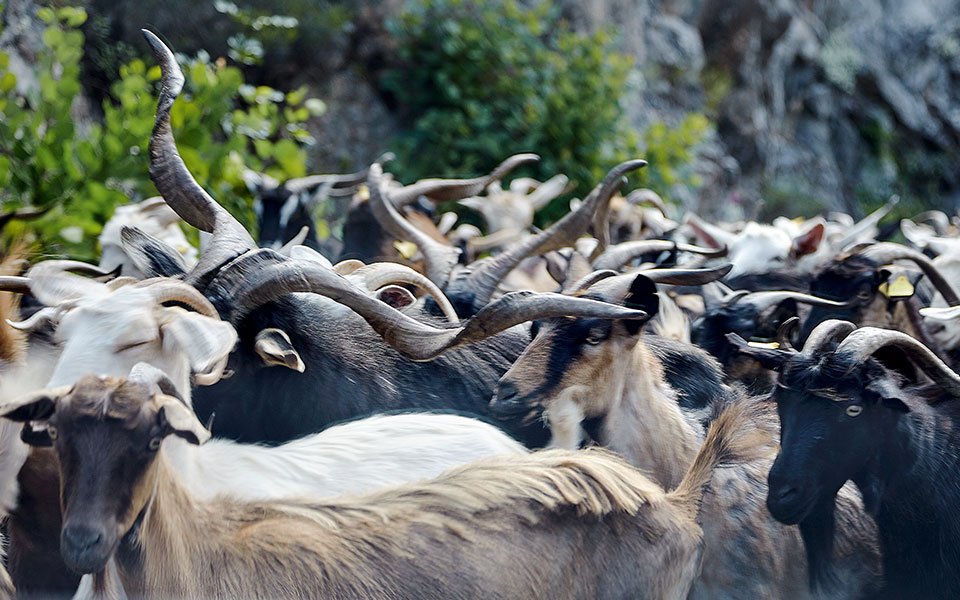
"Rush hour" in Zagori. Herds of goats are a common sight in the region.
© Giannis Zindridis
Acting as an extension of the region’s natural environment, the famed bridges and stepped stone cobbled roads (“Skales”) are small architectural wonders. The most beautiful of these cobbled roads are those of the villages of Vitsa and Vradeto. As far as bridges are concerned, the choice is a bit more difficult.
If you don’t want to travel a lot to see some of the area’s beautifully constructed bridges, drive towards the village of Kipoi. From there, the bridges of Kokkori, Kalogeriko, Kontodimou and Mylou are not far from each other, while the small bridges of Aghios Minas and Kapetan Arkouda are just a few kilometers away and are easier to find.
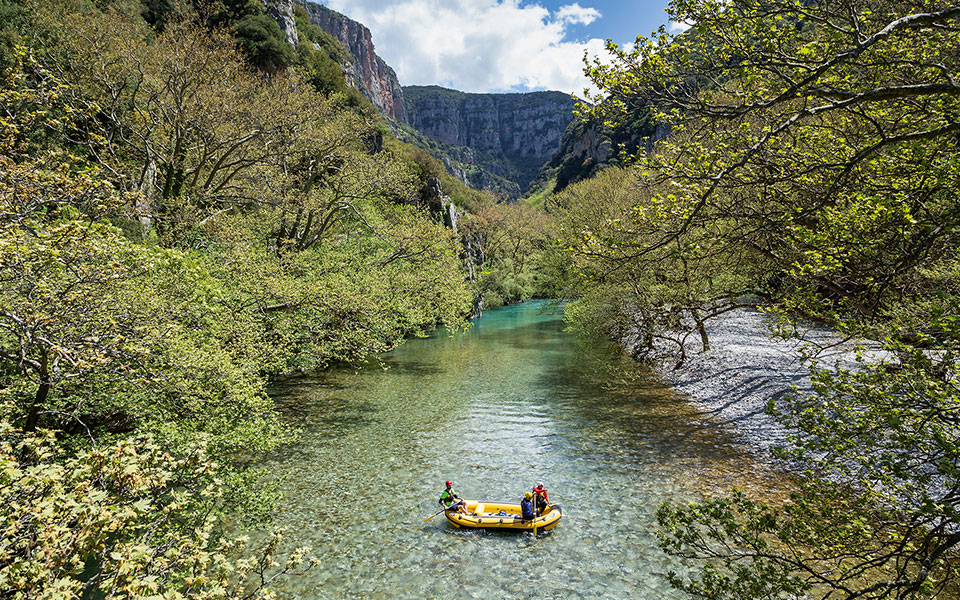
Voidomatis River. Rafting in its calm waters is ideal for beginners.
© Perikles Merakos
A rare case of a river where you can do rafting all year round, Voidomatis River is ideal for beginners. Depending on the weather conditions, visitors can enjoy canyoning, mountain biking, river trekking, and snowshoeing. Hiking, however, is undoubtedly the most engaging. Depending on the season, you can trek through the Vikos Gorge and make your way up to the Drakolimni lakes, located on the plateaus of Mount Tymfis.
Alternatively, you can enjoy the majestic Aristi Bridge – Kleidonia Bridge hiking trail, located next to Voidomatis River, or the hiking trail around the village of Kipoi with its many bridges (Tel. (+30) 694.475.0009).
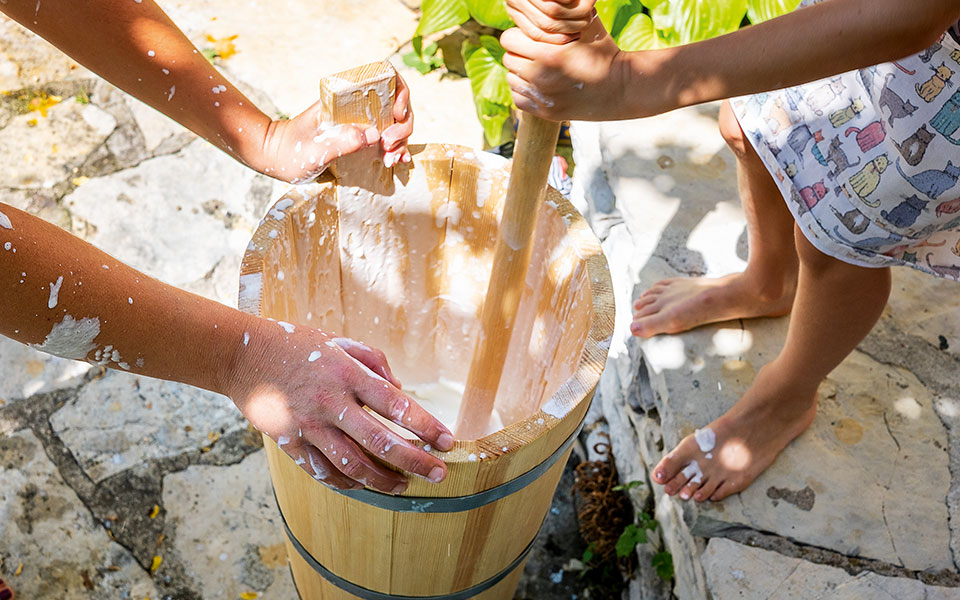
Guests at the Rokka guesthouse in the village of Elafotopos learn how to make butter.
© Penelope Thomaidi/Hans Lucas
In a region that continues to maintain a traditional way of life, Lena, Kostas and Lakis initiate visitors into life on the farm. At the Rokka Guesthouse in the village of Elafotopos, you have the chance of taking care of animals, foraging, preparing your own meals, and learning the art of weaving and how wool is made – the entire process from carding to dyeing wool (Tel. (+30) 694.248.5213).
Wild mushrooms and herbs complement local recipes, extremely filling and rich trahana and soups, a wide range of pies, organic vegetables, dairy and meat products from local farmers. Enjoy a variety of delectable dishes at Astra in the village of Megalo Papingo (Tel. (+30) 26530.421.08), Thoukidides in the village of Kapesovo (Tel. (+30) 697.998.3798) or Dia in the village of Mikro Papingo (Tel. (+30) 26530.412.57).
The village of Kipoi is located 37km from Ioannina, while Papingo is 60km away.
A challenging summer ride across the...
On a quiet slope of northern...
As autumn deepens, Ioannina glows with...
Each summer, a growing number of...